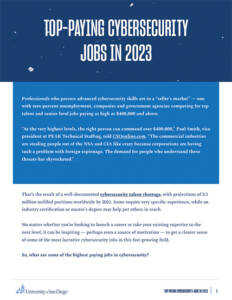Career opportunities for current and aspiring cybersecurity specialists have never been more plentiful or lucrative. You are probably already well aware that cybercrime is continually on the rise. In fact, cybercrime is forecasted to amount to $10.5 trillion by 2025 — which is just a few short years away. Combine this upward growth in the industry with the zero percent unemployment rate, and the result is a white-hot job market that features six-figure salaries.
Among the many cybersecurity jobs that companies are hiring for across all industries is the position of cybersecurity specialist. Like many roles within the wide-ranging, fast-growing field of cybersecurity, the responsibilities of the cybersecurity specialist can vary greatly depending on the company or organization and its specific needs.
What Is a Cybersecurity Specialist?
Cybersecurity specialists — often called information security specialists or network security specialists among other related job titles — play a central role in securing the information systems of businesses and other organizations.
Traditionally, network operations and IT professionals and teams handled core technology functions. But now that our world has become so heavily dependent on using advanced technology for practically everything, the stakes are higher than ever.
Therefore, cybersecurity specialists and their IT security colleagues have become essential to all organizations — working on the front lines and behind the scenes to protect digital systems and assets from hackers, threats and vulnerabilities.
[RELATED] Cybersecurity Jobs Report [Stats, Salaries, Insights, Infographic] >>
Cybersecurity Specialist Job Responsibilities
Depending on the position and the company or governmental agency, the job responsibilities of a cybersecurity specialist can range from diverse to narrow and specifically focused. Cybersecurity specialist job responsibilities can include:
- Putting in place security measures during the development of software systems, networks and data centers
- Guarding protected information or assets from unauthorized access or use
- Evaluating and identifying vulnerabilities and risks in hardware and software
- Determining the most effective ways to secure IT infrastructure
- Testing security strategies and defenses
- Building firewalls into system and network infrastructures
- Monitoring systems continually for intrusions and cyber attacks
- Training colleagues on security protocols and best practices
- Preparing reports to keep organization stakeholders apprised of security activities
- Discovering and securing potential vulnerabilities
- Discovering attacks or intrusions and taking mitigation actions
- Analyzing new methods that are being used by cyber criminals
- Keeping up to date on new trends, strategies and procedures to thwart attacks
- Updating security measures in response to ongoing changes and needs
Cybersecurity Specialist Career Paths
One of the top online resources for cybersecurity job seekers and those interested in pursuing a career in information security is CyberSeek.org. On its Career Pathways page, CyberSeek lists Cybersecurity Specialist as an entry-level position (one that pays an average annual salary of $99,652).
Common feeder roles listed here include experience in:
- IT networking
- Systems engineering
- Security intelligence
- Financial and risk analysis
According to CyberSeek, common job titles related to the Cybersecurity Specialist/Technician role include:
- Security Specialist
- Information Security Specialist
- IT Security Specialist
- IT Specialist Information Security
Experience in such jobs as systems administrator, security administrator and network administrator are extremely helpful for transitioning into a cybersecurity specialist role, but for motivated individuals, there are additional pathways as well.
Individuals working in other industries who aspire to position themselves for cybersecurity roles are often advised that industry certifications and advanced education can be invaluable in working toward cybersecurity career goals. (See more on this below.)
Cybersecurity Specialist Salaries
Here are some recent cybersecurity specialist salary snapshots from leading online employment and cybersecurity websites:
$99,625 – Cyberseek.org
$111,052 – ZipRecruiter.com
$127,093 – Salary.com (Information Security Analyst IV)
$108,162 – Indeed.com
Search “cyber security specialist $100,000” on LinkedIn and you find a cornucopia of high-paying jobs from across the country. The same is true on all of the leading employment websites.
10 Highest Paying States for Cybersecurity Specialist
| State | Annual Salary |
| New York | $125,664 |
| New Hampshire | $121,765 |
| California | $120,520 |
| Vermont | $115,042 |
| Idaho | $113,540 |
| Massachusetts | $112,804 |
| Wyoming | $112,247 |
| Maine | $111,451 |
| Washington | $109,857 |
| Hawaii | $109,639 |
10 Highest Paying Cities for Cybersecurity Specialist
| City | Average Annual Salary |
| San Francisco, CA | $138,537 |
| Fremont, CA | $132,901 |
| San Jose, CA | $129,598 |
| Oakland, CA | $128,166 |
| Tanaina, AK | $127,762 |
| Wasilla, AK | $127,761 |
| Sunnyvale, CA | $125,697 |
| Hayward, CA | $125,480 |
| Jackson, WY | $124,953 |
| Norwalk, CT | $124,741 |
*Salary estimates vary and are often adjusted in real-time based on changing data.
Cybersecurity Specialist Employment Outlook
The U.S. Bureau of Labor Statistics is a trusted source of information about countless job categories and includes listings packed with data about the future job outlook for a wide variety of occupations. At the present time, one of the few cybersecurity positions it tracks is also one of the most common — information security analyst.
It is a position (average annual salary: $102,600) whose core responsibilities overlap in some areas with those of the cybersecurity specialist, and the BLS is projecting job growth of 33% between now and 2030. The rate of job growth is much faster than the average for other occupations because organizations across all industries are discovering they “need to increase their information security capabilities in the face of growing cybersecurity threats.”
Cybersecurity Specialist – Skills Needed
According to CyberSeek, key skills and knowledge that are in-demand for the position of requested cybersecurity specialist include: information security, information systems, information assurance, network security, security operations, vulnerability assessment, project management, Linux, NIST cybersecurity framework.
As noted previously, job duties, responsibilities and required skills vary depending upon the position. Some common hard skills required may include:
- Intrusion detection
- Malware analysis and mitigation
- Programming knowledge (C, C++, C#, PHP, Perl, Java, and Shell)
- Ability to think like a hacker
- A well-rounded skillset (ex. penetration testing, IoT security, identity and access management, overall network security)
- Risk analysis and mitigation
- Cloud security
- Security analysis
Soft skills that employers are looking for in cybersecurity specialists include:
- Solid overall communication skills
- Written and oral skills needed to clearly communicate complex topics to colleagues
- Ability to work well both independently and as part of a team
- Problem-solving
- Critical thinking
- Self-motivation
Work Experience
Research shows that even many entry-level cybersecurity jobs require 3-5 years of related experience. According to a “State of Cybersecurity Hiring Report” from Burning Glass Technologies, “Most cybersecurity employers aren’t looking for newbies, and they aren’t looking for those without a college degree, either. Some 88% of cybersecurity postings specify a bachelor’s degree or higher, and roughly the same percent demand at least three years of experience.”
The requirement that cybersecurity hires have several years of work experience is closely connected to the talent shortage. This situation creates a “chicken-and-egg problem,” according to the report cited above. “If there are few opportunities for workers to enter the cybersecurity field, there are few opportunities to build the next generation of cybersecurity workers. Therefore, employers and training providers must work together to cultivate a talent pipeline for these critical roles.”
The key areas where this is happening include industry certifications and advanced degree programs.
Certifications for Security Specialists
CyberSeek reports that the most sought-after cybersecurity certifications from those hiring for the cybersecurity specialist/technician role include:
- CompTIA Security+
- Certified Information Systems Security Professional (CISSP)
- SANS/GIAC Certification
- Certified Information Systems Auditor (CISA)
- Certified Information Security Manager (CISM)
When searching for jobs, it is a good idea to develop a thorough understanding of the overall cybersecurity certification landscape to determine which certifications match up well with both your skills and interests, as well as which certifications employers are looking for in the types of jobs you are targeting.
Cybersecurity Education Requirements
Earning a master’s degree in cybersecurity is an option chosen by many current and aspiring cybersecurity professionals for many important reasons. For example, a cybersecurity master’s degree:
- Equips you with comprehensive knowledge and practical skills
- Positions you, in some cases, to demonstrate work experience in the form of in-depth exercises and hands-on sandbox lab work that closely simulates real-world scenarios
- Gives you a strong competitive advantage in the job market
Though there are many cybersecurity positions where a master’s degree is not required, it is increasingly common to see an advanced degree listed as “required” or “preferred” in listings for top jobs. According to CyberSeek’s breakdown of the cybersecurity specialist position, 63% of employers require a bachelor’s degree and 20% require a master’s degree.
Companies Hiring Cybersecurity Specialists
A recent search on LinkedIn found thousands of results. Other job titles that you might see in your search include IT Security Specialist, Network Security Specialist and Internet Security Analyst. Here’s a small sampling of companies hiring cybersecurity specialists.
- Microsoft
- IBM
- Amazon
- Dell Technologies
- Boeing
- FBI
- NSA
- U.S Department of Homeland Security
- Locke and McCloud
- Business Wire
- Tetra Tech
Professional Organizations for Cybersecurity Specialists
Cybersecurity organizations are a great way for those in the industry to keep up with current happenings, collaborate with like-minded individuals and more.
National Initiative for Cybersecurity Careers and Studies (NICCS): An online cybersecurity resource that connects government employees, students, educators and professionals with training providers.
International Information System Security Certification Consortium [(ISC)²]: An organization that specializes in providing training and certifications for cybersecurity professionals.
The Information Systems Security Association (ISSA): An organization of information security professionals and practitioners that provides educational forums, publications, networking opportunities and more.
Cybersecurity and Infrastructure Security Agency (CISA): A government-run organization dedicated to understanding, managing and reducing the risk to cyber and physical infrastructure.
Frequently Asked Questions
How to Stand Out When Applying
Cybersecurity specialist is a fascinating and multi-faceted position in a dynamic, fast-growing field. In addition to certifications and advanced education, cybersecurity job seekers are well-advised to connect with internship opportunities and do plenty of reading, self-learning and networking.
The University of San Diego, which offers a highly regarded online Master of Science in Cyber Security Operations and Leadership, also publishes a Cyber Blog featuring ongoing reports on the cybersecurity employment landscape.
What Are Some Other Top Cybersecurity Careers?
Cybersecurity is a high-paying field with a range of different types of job openings. Which role might be ideal for you? Take a moment to explore some of the other exciting careers in cybersecurity:






